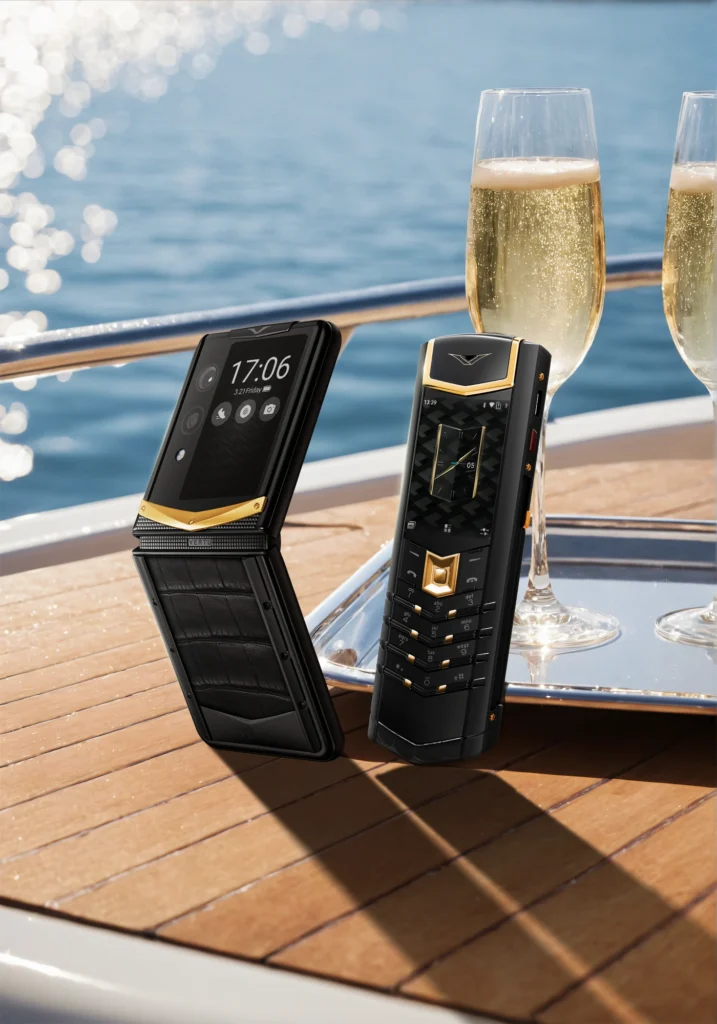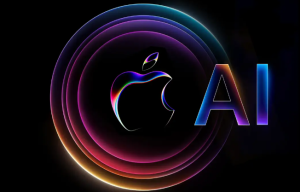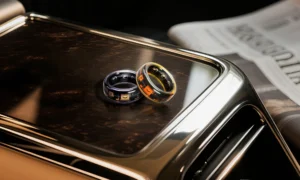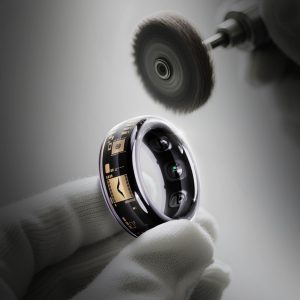You can see the difference between a smartphone and a regular mobile phone quickly. Smartphones let you go online, get apps, and take clear photos. Basic mobile phones are mostly for calling and texting. If you look at smartphone vs. mobile phone, you find that smartphones work like small computers you carry. You use them for maps, fun, and even for work. Picking one depends on how much tech you want every day.
Key Takeaways
- Smartphones are special mobile phones. They let you use the internet, apps, and take good photos. Basic mobile phones are mostly for calling and texting.
- Think about what you need every day when picking a device. If you want to use apps or go online, pick a smartphone.
- Smartphones let you change things to fit your style. You can pick wallpapers, ringtones, and move apps around.
- Battery life is different for each phone. Smartphones last about 1-2 days. Basic mobile phones can last 3-7 days because they use less power.
- Always look at service plans before you buy a phone. Smartphones need data plans. Basic phones can use simple calling plans.
Smartphone vs. Mobile Phone
Definitions
You may wonder what makes a smartphone different from a mobile phone. Experts say all smartphones are mobile phones, but not every mobile phone is a smartphone. Knowing the meaning of each helps you pick the right one.
Here is a table that shows what each term means:
| Term | Definition |
|---|---|
| Smartphone | A type of mobile phone with strong computing power and a smart operating system that lets you use many apps. |
| Mobile Phone | Devices made mainly for talking and texting, with few data features. |
A smartphone always has advanced computing and a smart operating system. A mobile phone is mostly for calls and texts. CTIA says smartphones are wireless phones with smart data features. IDC says smartphones have a smart operating system and can run many apps. Gartner says smartphones might have touch screens or keyboards, but these are not needed.
Tip: When you check if a device is a smartphone or mobile phone, see if it can run lots of apps and has a modern operating system. That is very important.
Core Differences
You should know the main differences between a smartphone and a mobile phone before you choose. Smartphones do more than just call people. They have smart computing, a system you can change, and support for many apps. Mobile phones are simple and focus on calls and texts.
Here are the basic things a smartphone needs:
- A screen big enough for browsing and apps
- Smart computing power for doing many things at once
- A mobile operating system that lets you use many apps
You can see the main differences in this table:
| Basic Functions of Mobile Phones | Advanced Features of Smartphones |
|---|---|
| Making calls | Smart computing abilities |
| Sending text messages | Operating systems you can change |
| Basic GSM services | Many kinds of apps |
| Limited internet access | Better user experience |
| Simple user interface | User interface with lots of apps |
Smartphones give you much more than just talking and texting. You can use a smartphone to go online, play games, and keep track of your plans. These smart features are always part of a smartphone.
Battery life and how long the device lasts also show differences. Here are some facts:
- Smartphone batteries last for 500 to 850 full charges before they get weak.
- Most smartphone batteries work well for two to three years.
- A survey found that 47% of smartphone problems happen in the first two years, and battery issues cause 42% of these problems.
How long a smartphone lasts depends on its design and what it is made of. Battery life and how long the battery works matter for your smartphone’s life. Basic mobile phones usually last longer and have fewer battery problems.
Now you know the meaning and main differences between smartphones and mobile phones. This helps you pick the best device for what you need.
Features
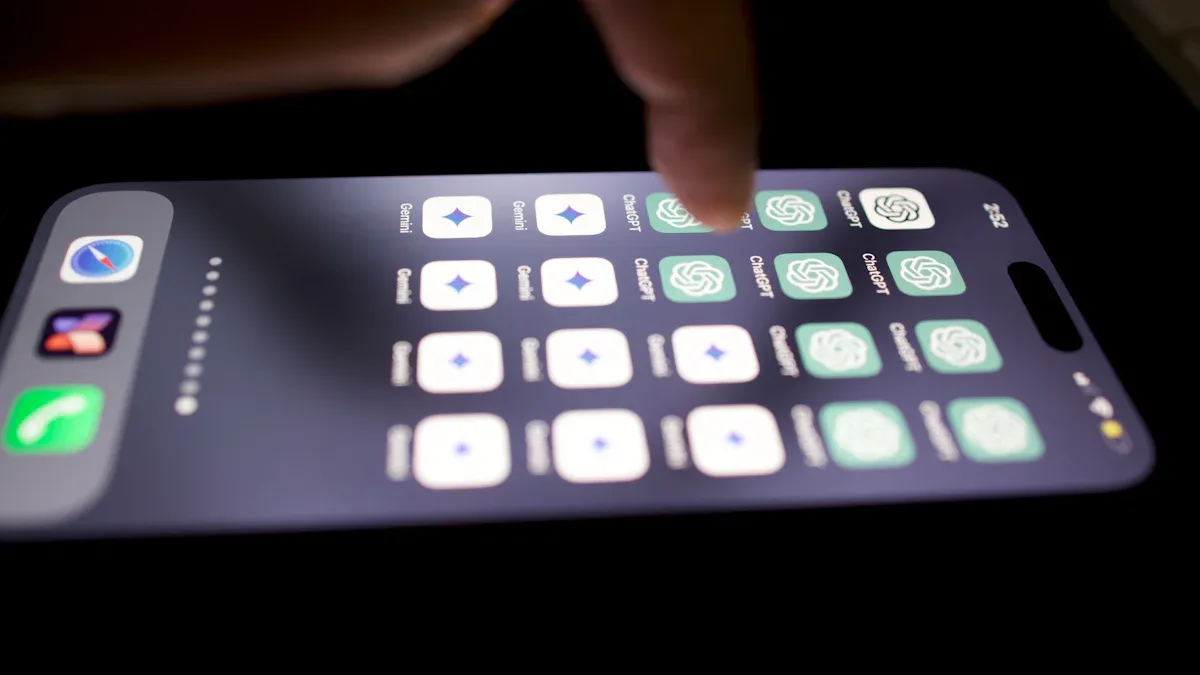
Communication
Both smartphones and mobile phones let you call and text. But smartphones can do much more. You can make video calls and send voice messages. Group chats are easy on smartphones. Many let you use social media apps to talk to friends. Here is a table that shows how their features compare:
| Feature | Smartphones | Mobile Phones |
|---|---|---|
| Voice Calling | Yes | Yes |
| Text Messaging | Yes | Yes |
| Internet Connectivity | Yes (advanced capabilities) | Limited (basic capabilities) |
| Applications | Wide range of apps available | Limited functionality |
| Multimedia | Advanced multimedia support | Basic multimedia capabilities |
| Additional Features | GPS, social media, video calling, etc. | Basic features only |
Smartphones help you connect in many ways. You can share photos and send emojis. Apps like WhatsApp or Messenger make chatting fun. Mobile phones are mostly for simple calls and texts.
Internet & Apps
Smartphones change how you use the internet. You can visit websites and watch videos. You can also download many different apps. In 2023, people spent 5.1 trillion hours using mobile apps. Most time on smartphones is spent in apps, not browsers. People use their smartphones for about 3 hours each day. Almost all that time is spent on apps. Social media, games, and streaming apps are very popular.
| Statistic Description | Value |
|---|---|
| Total hours spent on mobile apps in 2023 | 5.1 trillion hours |
| Percentage of mobile internet time spent in apps (US) | 80% |
| Average daily smartphone usage time | 3 hours 10 minutes |
| Percentage of smartphone time spent on social media apps | 34.7% |
Mobile phones cannot run many apps. You might get a few simple games or tools. But you cannot use advanced apps like Google Maps or TikTok. Smartphones let you set reminders and alarms. They also have high-quality cameras. New smartphones take photos as good as expensive cameras.
Tip: If you want lots of apps or great photos, pick a smartphone.
Customization
Smartphones let you make your device special. You can change wallpapers and ringtones. You can also organize your home screen. Your phone gives you content based on what you like. It learns your favorite music and tracks your calendar. It suggests contacts and uses your location for news or weather.
| Customization Feature | Description |
|---|---|
| Personalized Content | Suggestions based on your data and preferences |
| Device Information | Unique settings for each user |
| Music and Photos | Tailored playlists and photo albums |
| Contacts Data | Improved communication with important contacts |
| Calendar Access | Reminders for important dates |
| Browsing History | Relevant search results |
| Location Information | Location-based notifications |
| Third-Party App Data | Custom features from connected apps |
Mobile phones do not let you customize much. You might change a ringtone, but not much else.
Security
Smartphones keep your data safe with strong security. You get end-to-end encryption and secure operating systems. Some let you erase your data from far away. Certain smartphones, like Blackphone PRIVY 2.0 or Bittium Tough Mobile 2C, have extra strong security for professionals. Most smartphones help protect your privacy.
| Phone Model | Key Security Features | Target Users |
|---|---|---|
| Blackphone PRIVY 2.0 | End-to-end encryption, secure boot, remote wipe, blocks Google services | Professionals facing surveillance risks, executives, journalists |
| Bittium Tough Mobile 2C | Dual OS, tamper-proof design, secure offline mode, military-grade encryption | Government officials, military personnel, corporate security teams |
| Purism Librem 5 | Fully open-source, encrypted calls, works worldwide | Business leaders, legal professionals needing secure voice calls |
| Sirin Labs Finney U1 | Cold storage wallet for cryptocurrency, encrypted calls, three-factor authentication | Cryptocurrency users requiring secure transactions and privacy-focused communications |
| General Smartphone Security | End-to-end encryption, secure operating system, remote wipe capabilities | General users looking to enhance privacy on standard smartphones |
You should know that smartphones have more security risks. Over 95% of mobile malware comes from Trojans. Bad apps and network attacks can steal your data. Mobile phones have fewer risks because they do not use many apps or the internet.
Operating Systems
Mobile Phone OS
Basic mobile phones use simple operating systems. These systems help you call and text. They do not have many extra features. Most use old software like Nokia’s Series 30 or Series 40. You cannot install many apps on these phones. You only get a few built-in tools, like a calculator or alarm clock. Updates almost never happen, so the look stays the same for years. If you want a phone just for calls and texts, these systems work well.
Smartphone OS
Smartphones have advanced operating systems. These systems give you more choices and power. The most popular ones are:
- Android: Most people use this system. You can change it and get lots of apps.
- iOS: Only works on iPhones. It is safe and easy to use.
- Windows Phone: Tried to be popular but did not succeed.
- Harmony OS: Runs on many devices and is smooth to use.
- BlackBerry OS: Known for safety and work tools, but not common now.
- MagicOS: Used by HONOR phones, helps with multitasking and user experience.
Smartphone operating systems let you use new features. You can update your phone and change how it looks. These systems also work with touch screens, cameras, and fast internet.
App Support
Smartphones are special because they support many apps. Android and iOS are the leaders. Android lets people make all kinds of apps because it is open-source. iOS checks every app before you can get it, so apps are safe and good quality. You can find apps for games, learning, health, and more.
Smartphone operating systems give app makers tools and access to things like Bluetooth, cameras, and GPS. This means you get apps that do almost anything. Mobile phone operating systems do not let you add new apps. You cannot get new features or download popular apps. If you want a phone that can do more as you need it, pick a smartphone with a modern operating system.
Market & Pricing
Availability
Mobile phones and smartphones are sold almost everywhere. Some places have more users than others. Asia Pacific has the most users. This is because many people live there. They also make lots of phones in factories. North America is getting more users fast. More people there use 5G now. Europe’s market is older and grows slowly. Most people in Europe already have a phone. Not many new buyers show up each year.
If you look at the world market, some brands are very popular. Here is a table with the top mobile brands:
| Mobile Vendor | Market Share |
|---|---|
| Apple | 25.71% |
| Samsung | 20.96% |
| Xiaomi | 10.82% |
| Unknown | 9.32% |
| Vivo | 6.74% |
| Oppo | 5.88% |
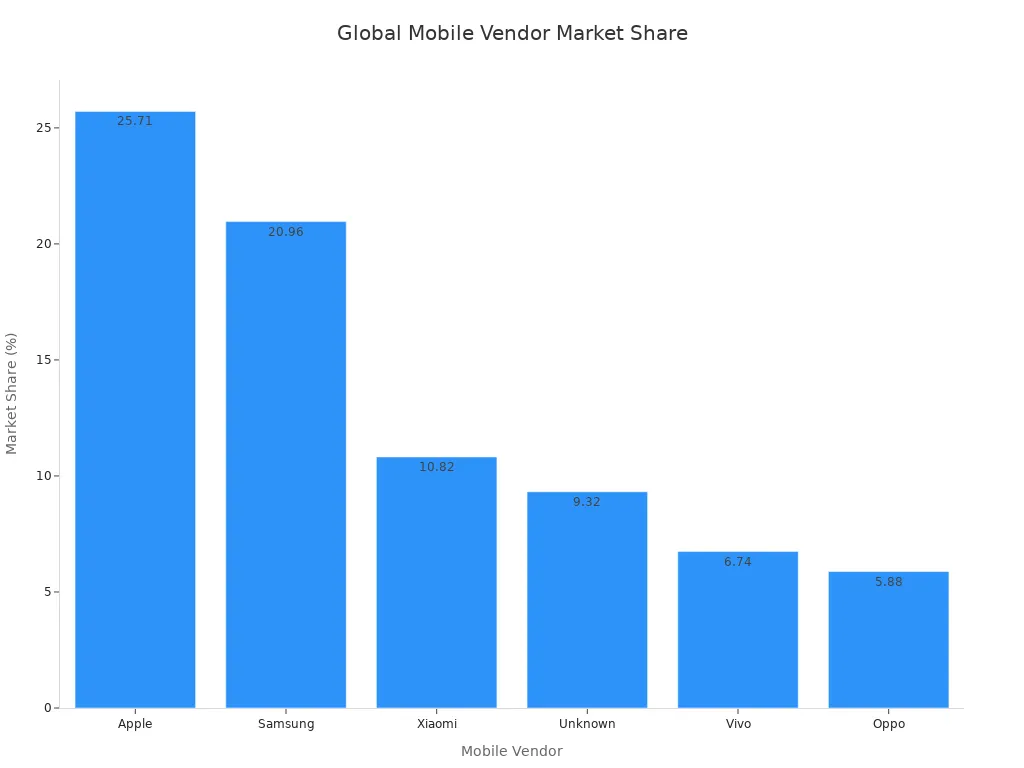
Smartphones have become much more popular in the last five years. 5G and new ways to use phones helped this happen. The COVID-19 pandemic also changed how people use devices. In 2021, more smartphones were shipped than in 2020. The number went up by 7.7%. Experts think that by 2025, one out of five connections will use 5G.
Cost
Price is important when you pick a smartphone or a basic mobile phone. In some countries, more people want smartphones as they earn more money. You might notice these things:
- People look at price before buying.
- If the price is right, people feel good about their choice.
- If phones cost more, people keep them longer.
- If prices or taxes are not clear, people wait to buy.
Smartphones cost more than basic mobile phones. If you want cool features, you pay more. Basic phones are good for saving money. They are also good if you only need simple things.
Plans
You need to think about service plans when you buy a phone. Smartphones work best with data plans. Data plans let you use the internet and apps. You can pick prepaid or contract plans. Basic mobile phones use simple calling and texting plans. These plans cost less and use little data. If you only call or text, a basic plan saves money. If you want to use social media or watch videos, you need a data plan for your smartphone.
Tip: Always check plan choices before you buy. The best plan helps you use your phone and save money.
Choosing Your Device
User Needs
When you pick a smartphone or a mobile phone, think about what you do every day. People want different things from their phones. Here are some tips for certain groups:
- Seniors
If you want something simple, choose phones with big buttons and easy menus. Phones with emergency help features can make you feel safe. You might also want phones that read text out loud or work with hearing aids. Cheaper phones are good for seniors who do not need extra features. - Tech-Savvy Users
If you like new technology, a smartphone is best for you. You can get lots of apps, change how your phone looks, and use cool things like voice helpers or smart home tools. - Budget Buyers
If you want to spend less, basic mobile phones are a good choice. They have batteries that last a long time and only the main features. These phones cost less and can last for years. You will not get the newest camera or software, but you save money. - Outdoor Enthusiasts
If you are outside a lot, pick phones that are tough and waterproof. Some have batteries that last a long time. Some smartphones can even talk to satellites if you are far away.
Note: Always pick a phone that fits what you need most. A simple phone is good for calls and safety. A smartphone is better if you want more things to do.
Pros & Cons
You should look at the good and bad points before you decide. The table below shows important things for people who want to save money:
| Advantages | Disadvantages |
|---|---|
| Battery lasts a long time | Not as fast |
| Costs less | May break more easily |
| Easy to use | Camera is not as good |
| Has the basics | Fewer updates |
| Good value | Not many extra features |
If you work or go to school, a smartphone helps you stay on track, check emails, and join video calls. If you love being outside, tough phones with strong batteries and bright screens are helpful. If you travel, a light phone with a simple look and long battery life is best.
- Outdoor phones can handle water and dust.
- Big screens help you see maps in the sun.
- Fast cameras and more space are good for taking pictures.
Always think about how you will use your phone. The best phone for you depends on your life, your money, and how much you like technology.
Smartphones and mobile phones are not the same. The table shows how they are different:
| Feature/Functionality | Smartphone | Traditional Mobile Phone |
|---|---|---|
| Operating System | Mobile OS included | No mobile OS |
| Multi-tasking | Gaming, socializing, apps | Calling and texting |
| Internet Connectivity | Full internet access | Limited or none |
| Applications | Many available | Few or none |
| Daily Use | Part of daily life | Basic communication |
If you want to pick a device, try these steps:
- Choose an operating system that works for you.
- Find a screen size that feels right.
- Decide how much money you can spend.
- Look at battery life for your needs.
- Pick a plan that fits how you use your phone.
Remember: The best phone is the one that matches your daily needs.
FAQ
What is the main reason to choose a smartphone over a mobile phone?
A smartphone gives you more things to do. You can use apps and go online. You can also take clear photos. Smartphones help you connect in many ways, not just with calls or texts.
Can you use social media on a basic mobile phone?
You cannot use most social media apps on a basic mobile phone. These phones do not let you use advanced apps. If you want Instagram, Facebook, or TikTok, you need a smartphone.
Do smartphones always cost more than mobile phones?
Most smartphones cost more than basic mobile phones. You pay extra for better features and new technology. Some smartphones are cheaper, but basic phones are usually the lowest price.
Which device has better battery life?
| Device Type | Average Battery Life |
|---|---|
| Smartphone | 1–2 days |
| Mobile Phone | 3–7 days |
Mobile phones last longer because they use less power. Smartphones use more energy since they run more apps and features.

